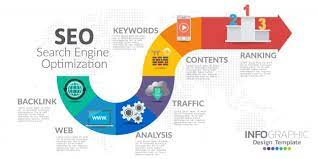
Search Engine Optimization (SEO) is a fundamental aspect of internet marketing that has the potential to propel businesses to new heights in the digital realm. In today’s competitive online landscape, having a strong SEO strategy is essential for increasing visibility, driving traffic, and ultimately, boosting conversions.
SEO involves a series of techniques and practices aimed at improving a website’s ranking on search engine results pages (SERPs). By optimising various elements such as keywords, meta tags, content quality, and backlinks, businesses can enhance their online presence and attract more organic traffic.
One of the key benefits of SEO is its ability to target specific audiences based on their search intent. By aligning your website content with relevant keywords and phrases that your target audience is likely to use, you can increase the chances of your site appearing prominently in search results when users are looking for products or services like yours.
Furthermore, SEO is a cost-effective marketing strategy compared to traditional advertising methods. While paid advertising can generate immediate results, SEO provides long-term value by establishing your website as a credible authority in your industry and driving consistent organic traffic over time.
In addition to improving search engine rankings, SEO plays a crucial role in enhancing user experience. Websites that are well-optimised for SEO tend to load faster, have intuitive navigation structures, and offer high-quality content that engages visitors. These factors not only contribute to higher rankings but also encourage users to spend more time on your site and take desired actions.
As search engines continue to evolve and refine their algorithms, staying up-to-date with the latest SEO trends and best practices is essential for maintaining a competitive edge. By investing in ongoing SEO efforts and adapting strategies to meet changing algorithms and user behaviours, businesses can stay ahead of the curve and maximise their online visibility.
In conclusion, search engine optimization is an indispensable tool for internet marketing success. By harnessing the power of SEO to improve website rankings, attract targeted traffic, enhance user experience, and drive conversions, businesses can unlock new opportunities for growth in the digital age.
Researching and targeting relevant keywords for your website content is a crucial tip in search engine optimization for internet marketing success. By identifying and incorporating the right keywords that align with your target audience’s search intent, you can significantly improve your website’s visibility on search engine results pages. Effective keyword research not only helps drive organic traffic to your site but also enhances the overall user experience by providing valuable and relevant information to visitors. By focusing on selecting and optimising content around these key terms, businesses can increase their chances of attracting qualified leads and achieving higher conversions in the competitive online landscape.
To enhance your website’s search engine visibility and attract relevant traffic, it is crucial to optimise key elements such as meta tags, headings, and URLs with targeted keywords. By strategically incorporating relevant keywords into these areas, you can signal to search engines the relevance of your content to users’ search queries. This optimisation not only improves your site’s chances of ranking higher in search results but also helps users quickly understand the relevance of your content, ultimately driving more organic traffic to your website.
Creating high-quality and engaging content that provides genuine value to your target audience is a cornerstone of effective search engine optimisation in internet marketing. By crafting content that is not only informative and relevant but also resonates with the needs and interests of your audience, you can establish credibility, build trust, and ultimately drive organic traffic to your website. Valuable content not only helps improve your search engine rankings but also encourages user engagement, fosters brand loyalty, and positions your business as an authority in your industry. Remember, quality content is key to capturing the attention of both search engines and users alike in the competitive online landscape.
Building quality backlinks from reputable websites is a crucial strategy in search engine optimisation for internet marketing. By establishing links from trusted sources, your website gains authority and credibility in the eyes of search engines. These backlinks act as endorsements, signalling to search algorithms that your content is valuable and worthy of higher rankings. As a result, investing time and effort in acquiring quality backlinks can significantly enhance your site’s visibility and organic traffic, ultimately leading to improved online success.
Regularly monitoring and analysing your SEO performance using tools such as Google Analytics is crucial for maximising the effectiveness of your internet marketing strategy. By tracking key metrics like website traffic, keyword rankings, and user engagement, you can gain valuable insights into the performance of your SEO efforts and identify areas for improvement. Google Analytics provides detailed data that allows you to measure the impact of your SEO activities, make informed decisions based on real-time information, and continuously refine your strategies to enhance online visibility and drive organic traffic to your website. Consistent monitoring and analysis are essential for staying ahead in the competitive digital landscape and achieving sustainable growth through search engine optimisation.